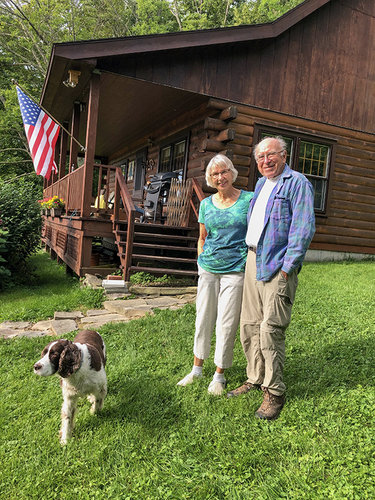‘In tune with the environment”: Reilly writes of the challenges and exhilaration of owning land
GUILDERLAND — Charles Reilly, at age 85, has just published his first book.
“So You Want to Buy Land … A Tree Farm and Log Cabin Memoir” runs from 1980 to 1993 with a current-day epilogue.
The grandson and son of coal miners — his mother was a coal miner’s daughter — Reilly was born “in 1939 toward the end of the Great Depression in the basement bedroom of the drafty, three-story hillside family home in Forest City Pennsylvania,” his memoir says.
When his father got a job at General Electric in Schenectady, the family eventually followed.
Reilly grew up to become a middle-school math teacher. At age 40, he said, he suffered a mid-life crisis.
“I was about to turn 40; I was married with three kids … being a teacher, not wanting to be an administrator, and that was life, you know. What else is there in life besides that?” he asked.
So he took up photography and would wander in the woods, taking pictures of deer and other wildlife.
The book opens with a description of one of those jaunts on a late winter day in 1980 when, driving his Volkswagen Beetle in the northern Catskills, he spotted a red-roofed farmhouse.
He asked the owner, John Brennan, if he could walk on his land to take pictures.
A friendship developed between the two and, after various negotiations, Reilly was able to purchase 125 acres of the land.
Reilly developed a firewood business and dreamed of building a log cabin on the land.
Tragedy struck in 1982 when his wife, Judy, a nurse, died of complications from diabetes. She was 40.
Their children ranged in age from 18 to 12.
Some of Reilly’s fondest boyhood memories were of hunting and fishing with his older brother, John.
In his book, he describes a day-long hunt that ended with killing a buck.
“Carefully, I touched its nose with the barrel of my gun, but the four-pointer’s eyes were lifeless. Suddenly tired, I sato a log, feeling both elation and remorse.
“Shooting a deer always triggered such mixed emotions in me. I thought of the circle of life, birth and death, death and birth, and realized I had played a small part in the never-ending cycle.”
His brother, John, had first taken him hunting when he was 14.
“We were in a car accident on the way in the snow,” Reilly told The Enterprise this week. “And that was amazing that I still wanted to go deer hunting after that.”
The second time he went hunting with his brother he yawned so widely that he dislocated his jaw and had to have it relocated by a doctor, Reilly said.
His youngest son, Fran, was distressed that his father would kill deer so Reilly made his property closed to hunters, which alienated his brother.
Asked how his children reacted to the self-publishing of his memoir, Reilly told The Enterprise that they had seen an earlier version years ago.
“As a result of the original book, Fran was very upset because I mentioned him. He is a very private person. We adopted him and his mother died. He is very mercurial.”
When Reilly married a widow with two children, “Fran wanted to quit school at 16 and he did.”
Eventually, Fran got his high school equivalency and went to a community college and then on to get a four-year degree, becoming a teacher.
“He has his administrator degree and became an assistant superintendent,” Reilly said. “After that original outburst of the book, he didn’t want to communicate with me and dropped out of the family.”
Reilly has followed his son’s career, he said, by reading articles in newspapers. “I’m very proud of him,” he said. “I mean, he made it on his own.”
Reilly said he wrote the book for his children and grandchildren and perhaps future generations.
A common thread in Reilly’s life has been caring about the environment. Guilderland readers will remember Reilly’s early work with Save the Pine Bush. He also spent a dozen or more years co-chairing with Ted Ausfeld, the Restoration Advisory Board that worked to have toxic waste buried at the Army depot in Guilderland Center cleaned up.
Reilly is currently the vice president of Schoharie Land Trust and the Reillys have placed their property under a conservation easement to protect it from development in the future.
“My wife, Melinda, loves the outdoors, too,” said Reilly, “and we did a lot of skiing and outdoor sports, and she liked the land. And it’s through her that the log cabin was eventually built.”
He added, “We are very in tune with the environment.”
Reilly waxes poetic in his memoir as he describes his love of the land.
In one passage, he describes a day, from sunup, “when deer come out to feed,” to midday, as “the shadow of a hawk glides silently over the pasture, sending to smaller residents scurrying for cover,” to evening, “when the sky silhouettes the silent flight of a darting bat hunting insects.”
Finally, there is nightfall: “In the silvery light of the slowly rising moon and the distant blinking of stars,” he writes, “the yipping and yowling of a coyote in a nearby valley drifts on the wind.”
Reilly concludes, “The ongoing challenges presented by owning land had proven to be exhilarating.”
Another common thread in Reilly’s life is writing. He has written many letters to the Enterprise editor over the years. And, in 1993, when the period covered in his now-published memoir ends, he started keeping a diary of his times at the cabin.
“So I did a quarter-century diary of when I go up to the cabin,” he said. “I put it on a computer and gave it to all my kids for a Christmas present. And it turned out to be 360 pages long.”
He also reads from his diary to his sister who has lost her eyesight and lives in a nursing home.
“I force her to listen to the diary when I go to see her and she loves it,” he said.
Another fond childhood memory, besides hunting, that played out in Reilly’s adult life on his land was his love of decorating a balsam fir for Christmas.
“Poppa worked the second shift from three to eleven-thirty at General Electric company,” he writes. “He would put the tree up and string the lights before leaving for work. Nana was in charge of hanging the ornaments and tinsel. The strands of shiny metal icicles had to be carefully separated then hung on each branch.
“I remember pulling the layers of lead apart and spreading them on the arm of the horsehair couch before putting them on the tree. Well past my bedtime, I’d watch my mother Nana affix the spire-like last ornament and, in the darkened living room, plug in the lights.
“To me, the tree with its shimmering silver tinsel and multicolored lights reflecting off the dozens of shiny balls symbolized Christmas.”
So, on his Schoharie property, he decided to plant Christmas trees “to ensure the memories I had would live on for both my family and other families.”
He and his wife, Melinda, planted 2,000 trees by hand the first year with just a spade and a tape measure.
They planned to open a cut-your-own business once the trees grew big enough.
“We started off very optimistically,” Reilly said this week. “We were going to make a lot of money on it, which we never did.”
Reilly goes up to his land and cabin at least once a week, traveling from his home in Guilderland, he said. Through the years, he’s always had a dog with him. He now has an 11-month-old puppy, Honeybear, a mini Aussie goldendoodle. “The Aussie is where she likes to herd people,” he said.
The Reillys still plant 40 or 50 Christmas trees every year.
“Once a year, the first weekend in December, we invite all our family and friends to come up,” he said. “They pick the tree out, they cut the tree, their kids come up. If there’s snow, they can sleigh ride.
“We make a big pot of venison chili and we feed people and they just have a great time. And now some of the kids are adults and have their kids and still come back up and cut a Christmas tree.”
****
Charles Reilly’s 173-page paperback book sells on Amazon for $10. “I’ve got a number of copies myself that sell for the same price,” he said. “I put the price on the book low.”



